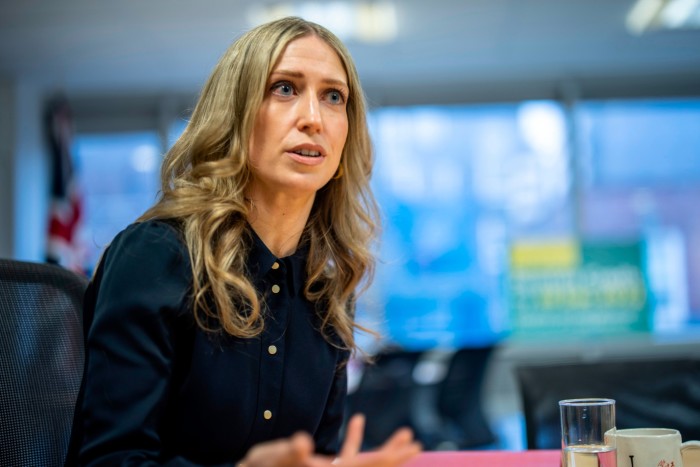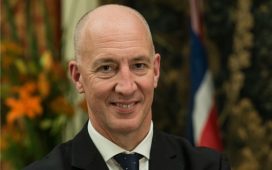Business groups have urged the government not to raise taxes on UK plc in its efforts to close a £22bn hole in the public finances, after Sir Keir Starmer warned that those with “the broadest shoulders” would be targeted in the upcoming Budget.
Louise Hellem, chief economist at CBI lobby group, said the Treasury should pledge not to introduce sector-specific windfall taxes on businesses or increase national insurance contributions paid by employers as it seeks to boost growth and restore Britain as a “stable investment destination”.
“Businesses want the government to provide the stability and certainty needed to drive investment,” she said.
Anna Leach, chief economist at the Institute of Directors, called on ministers to “move away from the damaging chop and change” and ensure tax policy for businesses and entrepreneurs was “made in a well-considered and long-term fashion”.
In a keynote speech in Downing Street on Tuesday, Starmer gave his strongest signal yet that his government would raise taxes to close the gap in the public finances. Labour has quantified this “black hole” at £22bn in the current fiscal year.
“There’s a Budget coming in October and it’s going to be painful,” he said. “Those with the broadest shoulders should bear the heavier burden.”
After Starmer’s speech Number 10 reiterated its existing pledge not to increase the 25 per cent rate of corporation tax.
But experts said businesses and wealthy taxpayers were potential targets in October given chancellor Rachel Reeves’s decision to rule out rises in income tax, VAT and national insurance, which account for the bulk of government revenue.
Helen Miller, head of tax at the Institute for Fiscal Studies think-tank, said Reeves’s move to take “the big, easy tax increases off the table” meant she would have to “scrape the barrel . . . to raise serious money”.
One former senior Whitehall official said banks would be one possible target, noting: “There are banks who’ve been making good profits out of higher interest rates — they’ve got broad shoulders and no one likes banks.”
Interest earned by NatWest, Barclays, Lloyds and Santander on their Bank of England reserves surged 135 per cent to more than £9bn last year, according to figures published in May by the House of Commons Treasury select committee.
A “sensibly crafted” levy could raise several billion pounds and be framed as the “flip side of the losses the Treasury is making on quantitative tightening”, the former official added.
The Treasury has been incurring losses as the BoE sells bonds bought as part of its quantitative easing programme. But Reeves said before the election that she did not want to hit the banks with higher taxes.
Miller said that if Labour wanted to extract more from companies, it could increase the 19 per cent corporation tax rate applied on small profits of £50,000 or less.
One option that could raise many billions would be putting employer national insurance on pension contributions.
Harry Quilter-Pinner, interim executive director at the Institute for Public Policy Research, said Starmer was right to turn to “those with the broadest shoulders to contribute more”, as he has already done with “non-doms” and oil and gas companies, instead of raising taxes for working people struggling with living costs.
The IPPR, a left-leaning think-tank influential in Starmer’s administration, has previously advocated raising tax on dividends and share buybacks.
Laura Trott, shadow chief secretary to the Treasury, said British industry would be forced to “foot the bill” for Labour’s spending plans.
Warning that businesses needed “confidence and certainty”, she accused Starmer of planning to “unleash a Pandora’s box of taxes” that would “stifle growth, kill investment and smash competitiveness”.

Britain’s richest taxpayers have already been stepping up efforts to redraw their tax affairs ahead of the Budget, which tax experts expect to boost levies on capital gains and inheritance.
Analysts have said equalising the tax rates on capital gains with those on income tax would, if gains were indexed to inflation, potentially raise billions of pounds in the high-single-digits every year.
Pensions are also potentially in the crosshairs, although any changes would be highly contentious.
Restricting relief on pension contributions to the basic rate of income tax would in the long term represent a £15bn a year increase in taxation, according to the IFS. Most of that would come from the top 20 per cent of earners, although the think-tank has warned such a move could deter people from saving.
Other options include reducing the amount of a pension pot that can be extracted tax-free. Bringing pension pots within the scope of inheritance tax while abolishing agricultural and business reliefs against IHT could raise up to about £1.5bn a year.
Laura Suter, director of personal finance at investment company AJ Bell, said Starmer’s speech would increase focus on capital gains and inheritance taxes, and reignite speculation about a specific wealth tax.
“This could just take the form of increasing existing taxes for investors and the top earners, or it could be a new, standalone tax on those with the biggest pockets,” she added.













